Portugal, located on the southwestern edge of Europe, is a country known for its stunning landscapes, rich history, and vibrant culture. With its picturesque coastline, charming cities, and warm Mediterranean climate, Portugal offers a unique blend of tradition and modernity that captivates visitors from around the world. From the cobblestone streets of Lisbon to the vineyards of the Douro Valley, Portugal is a treasure trove of experiences waiting to be discovered.
Table of Contents
Geography
Portugal is situated on the Iberian Peninsula in southwestern Europe, bordered by the Atlantic Ocean to the west and south and sharing a land border with Spain to the east and north. The country covers an area of approximately 92,212 square kilometers, making it one of the smaller nations in Europe. Portugal’s diverse geography includes rolling hills, lush valleys, and a rugged coastline dotted with beautiful beaches and dramatic cliffs. The country is home to several mountain ranges, including the Serra da Estrela, which is the highest point in mainland Portugal, and the fertile plains of the Alentejo region.
States of Portugal
Portugal does not have states. Instead, it is divided into 18 districts on the mainland and 2 autonomous regions (the Azores and Madeira). The autonomous regions have their own regional governments and more autonomy compared to the districts on the mainland. Here is a table listing all the districts of mainland Portugal along with the two autonomous regions:
| No. | District/Region |
|---|---|
| 1 | Aveiro |
| 2 | Beja |
| 3 | Braga |
| 4 | Bragança |
| 5 | Castelo Branco |
| 6 | Coimbra |
| 7 | Évora |
| 8 | Faro |
| 9 | Guarda |
| 10 | Leiria |
| 11 | Lisboa |
| 12 | Portalegre |
| 13 | Porto |
| 14 | Santarém |
| 15 | Setúbal |
| 16 | Viana do Castelo |
| 17 | Vila Real |
| 18 | Viseu |
| 19 | Azores (Autonomous Region) |
| 20 | Madeira (Autonomous Region) |
History
Portugal’s history is marked by exploration, conquest, and cultural exchange. The foundations of modern Portugal can be traced back to the 12th century when Afonso I declared independence from the Kingdom of León, establishing the County of Portugal. Over the next few centuries, the country expanded its territory through conquests, particularly during the Age of Discoveries in the 15th and 16th centuries.
This era saw Portuguese explorers, such as Vasco da Gama and Ferdinand Magellan, embark on voyages that opened new trade routes and established colonies in Africa, Asia, and South America, making Portugal a global maritime power. However, the wealth generated from exploration and colonization was not without challenges. The 16th century marked the beginning of a decline in Portuguese influence as rival powers emerged, leading to conflicts and territorial losses.
The Restoration War of 1640 eventually restored Portugal’s independence from Spain, which had ruled the country for 60 years. The 18th and 19th centuries brought significant social and political changes, culminating in the establishment of a constitutional monarchy and the eventual transition to a republic in 1910.
The 20th century was marked by political turmoil, including a dictatorship under António de Oliveira Salazar and the Carnation Revolution in 1974, which peacefully overthrew the regime and restored democracy. Portugal’s accession to the European Union in 1986 signaled its reintegration into the global community, promoting economic development and cultural exchange.
Top Ten Most Famous Places to Visit in Portugal
Lisbon
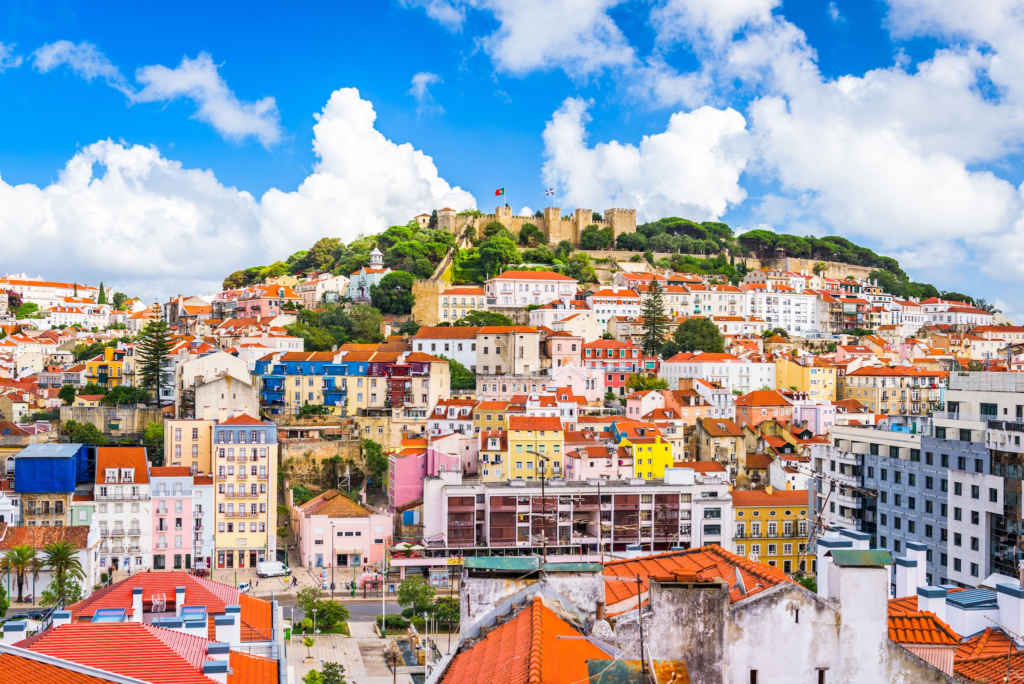
Lisbon, the capital city of Portugal, is a vibrant metropolis known for its stunning architecture, historic neighborhoods, and lively atmosphere. Visitors can explore the narrow streets of Alfama, visit the iconic Belém Tower, and enjoy panoramic views from the São Jorge Castle. The city’s rich cultural scene is showcased through its museums, galleries, and traditional Fado music performances.
Porto
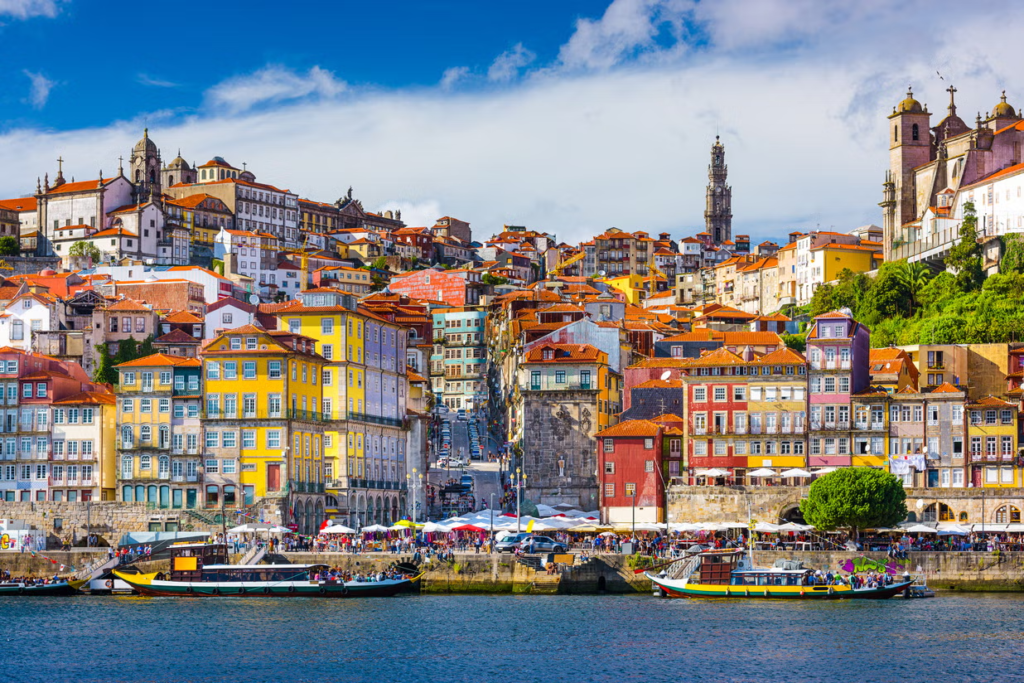
Porto, located along the Douro River, is famous for its port wine production and picturesque riverside views. The Ribeira district, with its colorful buildings and lively cafes, is a UNESCO World Heritage Site. Visitors can tour the historic Livraria Lello bookstore, one of the most beautiful in the world, and sample local delicacies at the Mercado do Bolhão.
Sintra

Sintra is a fairy-tale town nestled in the Sintra mountains, known for its romantic palaces and lush gardens. The colorful Pena Palace, with its whimsical architecture, and the Moorish Castle, offering stunning views of the surrounding landscape, are must-visit attractions. Sintra’s enchanting atmosphere has made it a UNESCO World Heritage Site.
Algarve
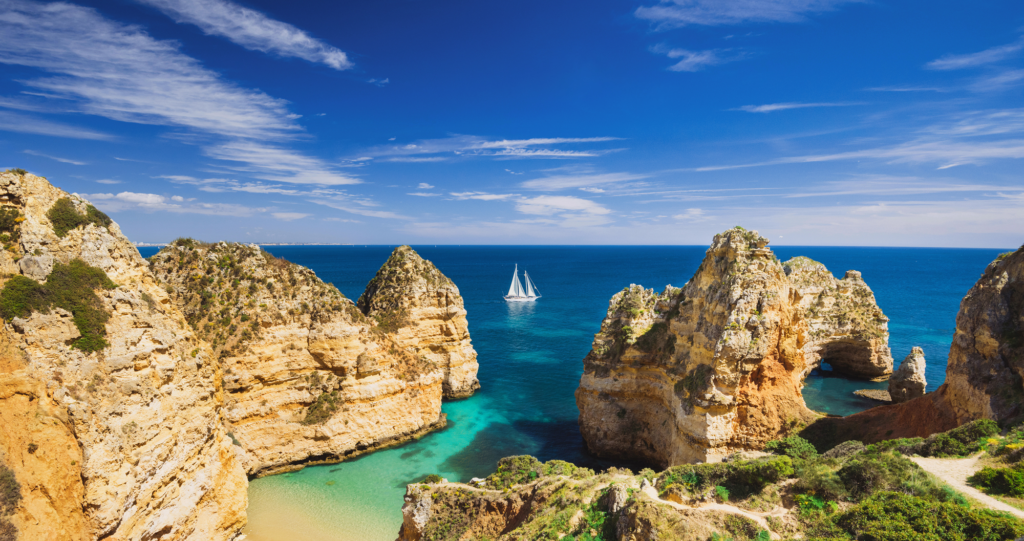
The Algarve region is renowned for its stunning beaches, charming fishing villages, and dramatic coastline. With crystal-clear waters and golden sands, the Algarve is a popular destination for sun-seekers and water sports enthusiasts. Visitors can explore the picturesque towns of Lagos, Albufeira, and Tavira, and enjoy fresh seafood at local restaurants.
Évora

Évora, a UNESCO World Heritage Site, is a city steeped in history and ancient architecture. The Roman Temple of Évora, the Cathedral of Évora, and the Chapel of Bones are among the city’s most significant landmarks. Évora’s charming streets and traditional cuisine make it a delightful destination for history lovers.
Douro Valley
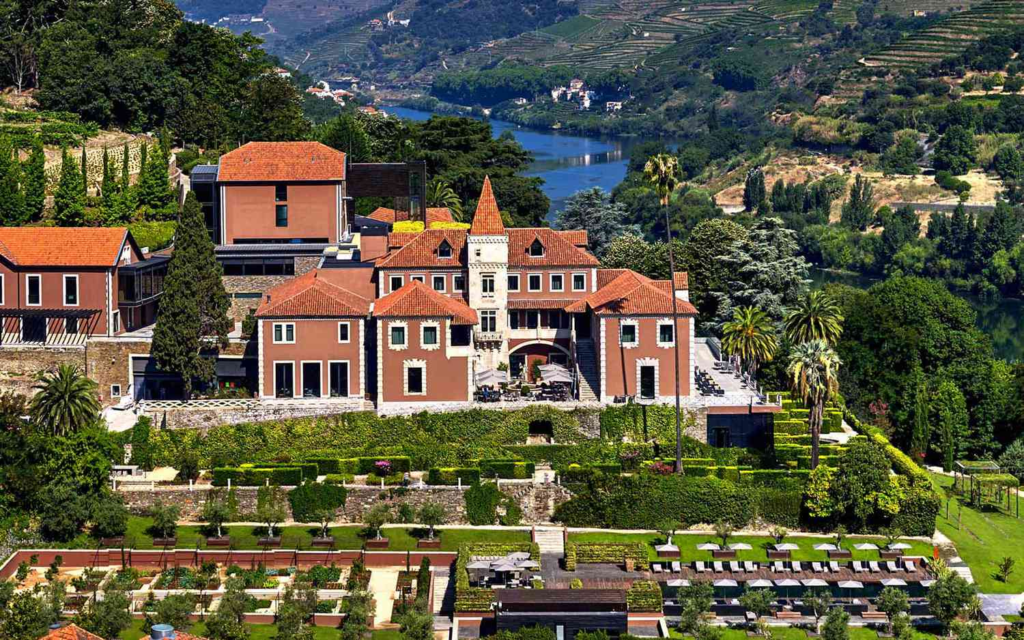
The Douro Valley, known for its terraced vineyards and breathtaking landscapes, is a UNESCO World Heritage Site and the heart of Portugal’s wine country. Visitors can take a scenic boat cruise along the Douro River, visit wine estates, and sample the region’s famous port wine while enjoying stunning views of the rolling hills.
Coimbra
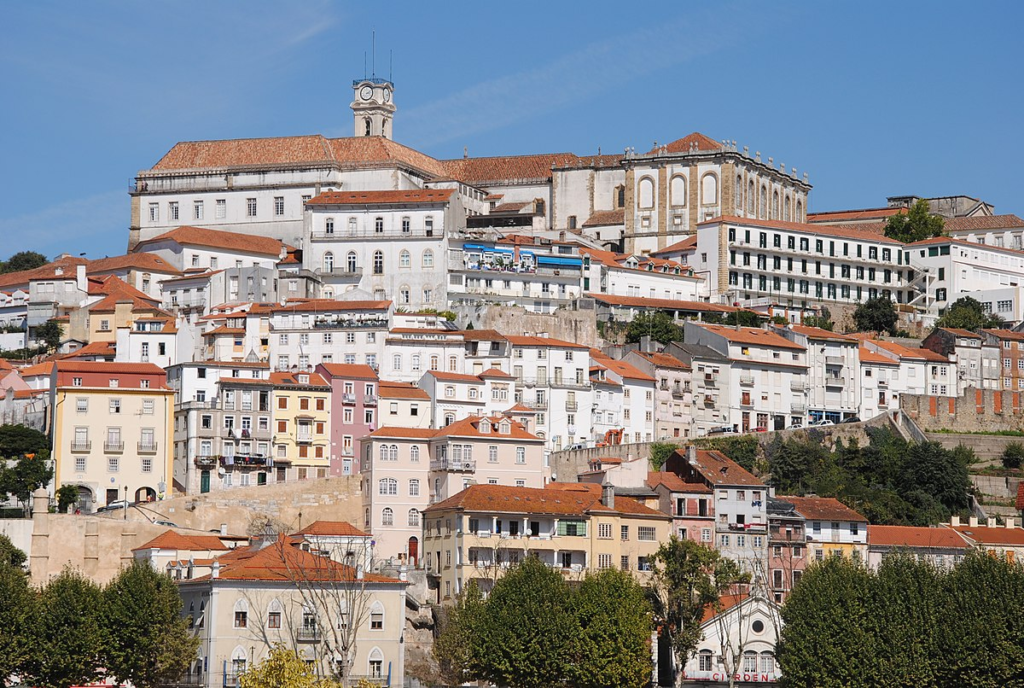
Coimbra is home to one of the oldest universities in Europe, the University of Coimbra, which dates back to 1290. The university’s beautiful library, Joanina Library, and the historic Old Town are major attractions. Coimbra’s rich academic tradition and lively student atmosphere make it a unique destination in Portugal.
Cascais
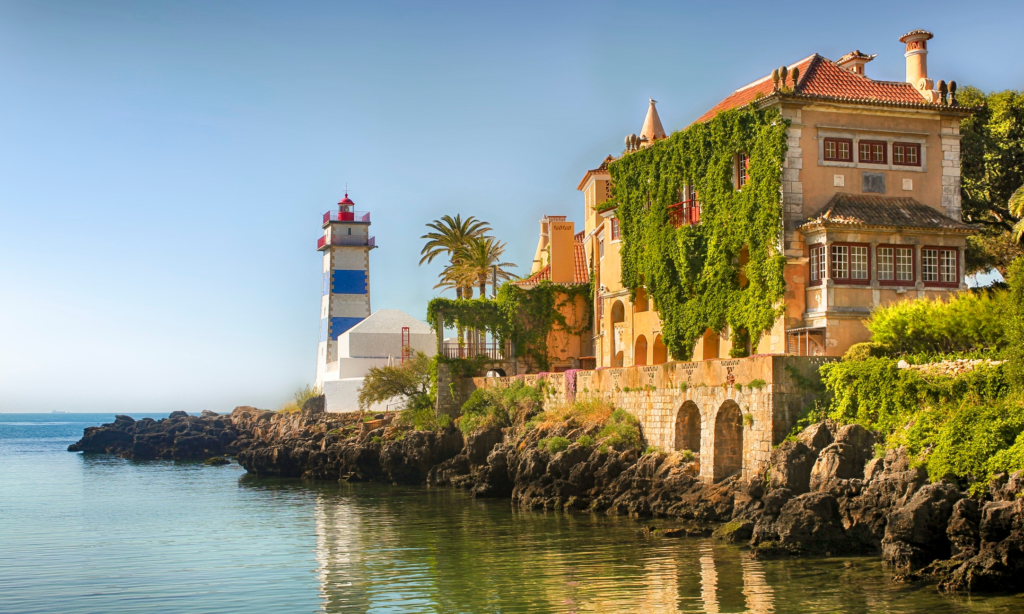
Cascais is a charming coastal town known for its beautiful beaches, historic mansions, and vibrant marina. The Boca do Inferno (Hell’s Mouth) cliff formation is a popular attraction, offering stunning ocean views. Cascais is also a gateway to the nearby Sintra-Cascais Natural Park, providing opportunities for hiking and outdoor activities.
Madeira

Madeira, an archipelago located in the Atlantic Ocean, is famous for its stunning landscapes, lush gardens, and subtropical climate. The capital city, Funchal, features beautiful botanical gardens and a vibrant market. Visitors can hike the Levadas (irrigation channels) through the mountainous terrain and enjoy the island’s renowned wine.
Nazaré
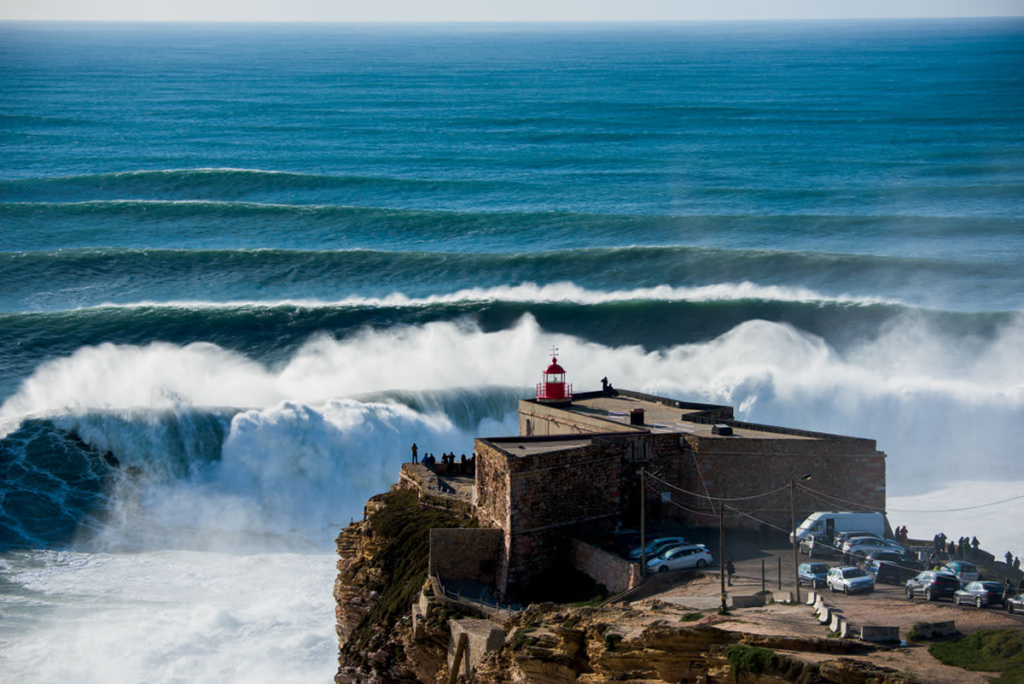
Nazaré is a picturesque fishing village known for its stunning beaches and massive waves, attracting surfers from around the world. The iconic Nazaré lighthouse offers breathtaking views of the Atlantic Ocean, and visitors can explore the charming town and enjoy fresh seafood at local restaurants.
Culture
The official language of Portugal is Portuguese, a Romance language derived from Latin. Portuguese is spoken by the vast majority of the population, and it has a rich literary tradition that includes renowned authors such as Luís de Camões and Fernando Pessoa. The language has various dialects and regional variations, reflecting the diverse culture of Portugal and its former colonies. Portuguese is also one of the most widely spoken languages globally, with millions of speakers in countries such as Brazil, Angola, and Mozambique.
Portuguese lifestyle is characterized by a strong sense of community, family values, and a relaxed approach to life. The Portuguese take pride in their culinary traditions, with meals often being a time for family gatherings and socializing. Traditional dishes such as bacalhau (codfish), caldo verde (green soup), and pastéis de nata (custard tarts) are staples of Portuguese cuisine. The country is also known for its love of coffee, with espresso being a popular beverage enjoyed throughout the day.
Portugal is rich in traditions and customs that reflect its cultural heritage. Festivals play a significant role in Portuguese life, with events such as Carnaval, Festa de São João, and the Feast of Our Lady of Fátima attracting locals and tourists alike. Fado music, characterized by its melancholic melodies and heartfelt lyrics, is an essential aspect of Portuguese culture, often performed in traditional taverns. The importance of family and social connections is evident in the Portuguese way of life, where communal meals and gatherings are cherished.
Festivals
Portugal hosts a variety of festivals throughout the year, celebrating everything from religious traditions to cultural heritage. One of the most famous festivals is the Festa de São João in Porto, where locals celebrate with street parties, fireworks, and the traditional custom of hitting each other on the head with plastic hammers.
The Carnaval celebration, held in various cities, features vibrant parades, music, and dancing. The Festas de Lisboa during June celebrate the city’s patron saint, St. Anthony, with street parties, food stalls, and live music. Additionally, the Madeira Flower Festival showcases the island’s stunning flora through colorful parades and artistic displays.
Economy
Portugal’s economy is diverse and has undergone significant transformation in recent years. Key sectors include tourism, agriculture, manufacturing, and technology. The country is known for its production of cork, wine, olive oil, and textiles. Tourism plays a vital role in the economy, attracting millions of visitors each year who come to explore Portugal’s rich history, culture, and natural beauty. The country has made strides in innovation and technology, fostering a growing startup ecosystem. Portugal’s membership in the European Union has further strengthened its economic ties and facilitated trade and investment.
Tourism
Portugal’s stunning landscapes, historic cities, and vibrant culture make it a popular tourist destination. Visitors flock to cities like Lisbon, Porto, and Sintra to explore their unique attractions and experience the local lifestyle. The country’s beautiful coastline, with its picturesque beaches and charming fishing villages, attracts sun-seekers and water sports enthusiasts.
Portugal’s rich cultural heritage is celebrated through its festivals, gastronomy, and traditional arts, making it an enticing destination for travelers seeking diverse experiences. The country’s well-developed infrastructure and welcoming atmosphere continue to draw tourists from around the globe.
Top Eight Most Famous Food of Portugal


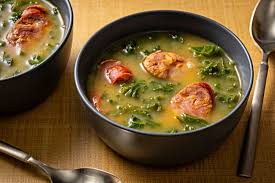

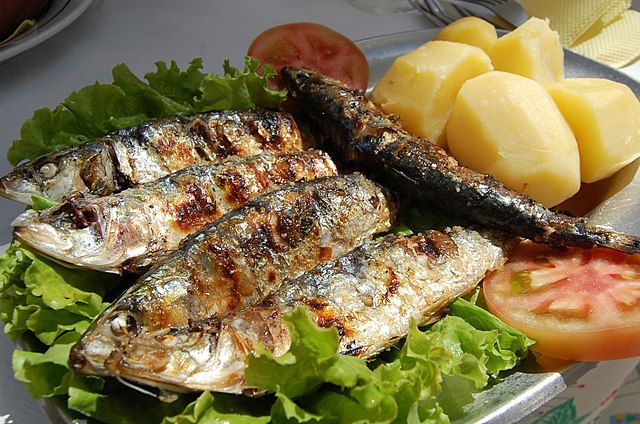



Interesting Facts About Portugal
- Portugal is one of the oldest countries in Europe, with its borders unchanged since 1139.
- The Portuguese language is the sixth most spoken language in the world.
- Portugal is the world’s largest producer of cork, accounting for over 50% of global production.
- The country is home to the oldest bookstore in the world, Livraria Bertrand, established in 1732.
- Portugal has won the UEFA European Championship in football in 2016.
- The country has a rich maritime history, with the Age of Discoveries leading to the establishment of a global empire.
- Portugal is famous for its beautiful azulejos (ceramic tiles) that adorn buildings throughout the country.
- The Douro Valley is one of the oldest wine regions in the world and a UNESCO World Heritage Site.
- Portugal has more than 800 kilometers of coastline, offering stunning beaches and scenic views.
- The country was the first to abolish the death penalty in 1867.
Future Perspective
Portugal is poised for continued growth and development in the coming years, focusing on innovation, sustainability, and cultural preservation. The country aims to enhance its position as a leader in renewable energy and technology while maintaining its rich cultural heritage. Investments in infrastructure, education, and tourism will play a crucial role in shaping Portugal’s future. As the country embraces modernization, it seeks to balance progress with the preservation of its unique traditions, ensuring a vibrant and sustainable future for generations to come.
Conclusion
Portugal, with its captivating landscapes, rich history, and vibrant culture, is a country that offers a wealth of experiences for travelers and history enthusiasts alike. From the historic streets of Lisbon to the scenic beauty of the Douro Valley, and from the charming towns of the Algarve to the cultural richness of Porto, Portugal’s allure is undeniable. As the country continues to evolve, it remains a destination where tradition and modernity coexist harmoniously, inviting all to explore its treasures.
let’s enjoy few years on earth with peace and happiness….✍🏼🙏

